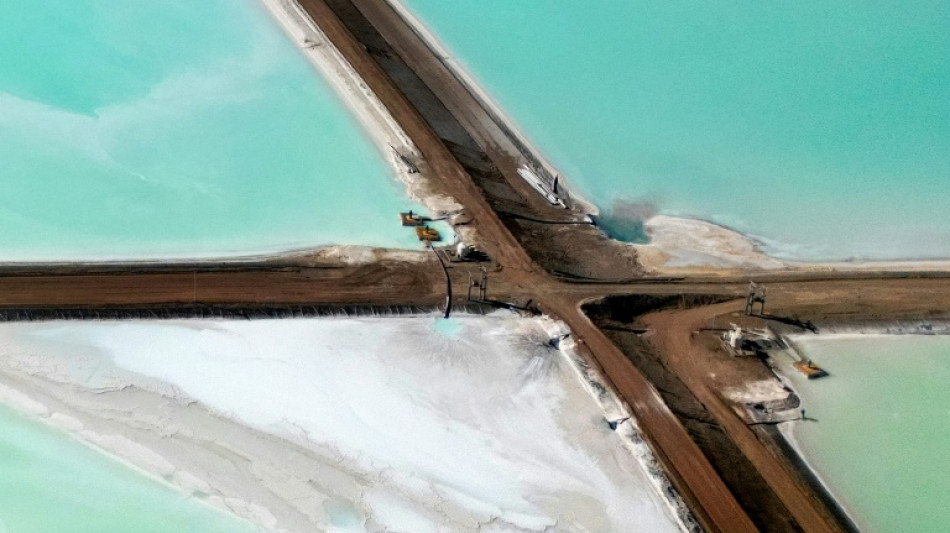
-
 Fear in Sicilian town as vast landslide risks widening
Fear in Sicilian town as vast landslide risks widening
-
'Forced disappearance' probe opened against Colombian cycling star Herrera

-
 Seifert, Santner give New Zealand consolation T20 win over India
Seifert, Santner give New Zealand consolation T20 win over India
-
King Charles III warns world 'going backwards' in climate fight

-
 Minneapolis activists track Trump's immigration enforcers
Minneapolis activists track Trump's immigration enforcers
-
Court orders Dutch to protect Caribbean island from climate change

-
 Sterling agrees Chelsea exit after troubled spell
Sterling agrees Chelsea exit after troubled spell
-
Rules-based trade with US is 'over': Canada central bank head
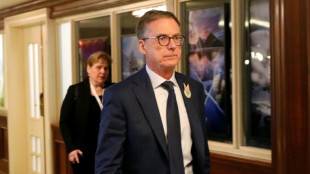
-
 Lucas Paqueta signs for Flamengo in record South American deal
Lucas Paqueta signs for Flamengo in record South American deal
-
Holocaust survivor urges German MPs to tackle resurgent antisemitism
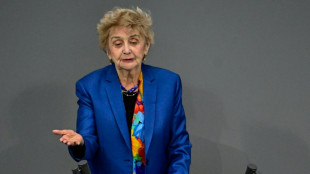
-
 'Extraordinary' trove of ancient species found in China quarry
'Extraordinary' trove of ancient species found in China quarry
-
Villa's Tielemans ruled out for up to 10 weeks

-
 Google unveils AI tool probing mysteries of human genome
Google unveils AI tool probing mysteries of human genome
-
UK proposes to let websites refuse Google AI search

-
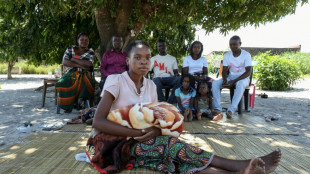 'I wanted to die': survivors recount Mozambique flood terror
'I wanted to die': survivors recount Mozambique flood terror
-
Trump issues fierce warning to Minneapolis mayor over immigration

-
 Anglican church's first female leader confirmed at London service
Anglican church's first female leader confirmed at London service
-
Germany cuts growth forecast as recovery slower than hoped
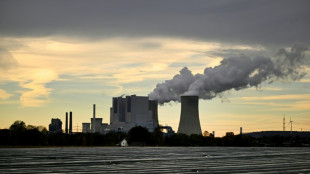
-
 Amazon to cut 16,000 jobs worldwide
Amazon to cut 16,000 jobs worldwide
-
One dead, five injured in clashes between Colombia football fans

-
 Dollar halts descent, gold keeps climbing before Fed update
Dollar halts descent, gold keeps climbing before Fed update
-
US YouTuber IShowSpeed gains Ghanaian nationality at end of Africa tour

-
 Sweden plans to ban mobile phones in schools
Sweden plans to ban mobile phones in schools
-
Turkey football club faces probe over braids clip backing Syrian Kurds

-
 Deutsche Bank offices searched in money laundering probe
Deutsche Bank offices searched in money laundering probe
-
US embassy angers Danish veterans by removing flags

-
 Netherlands 'insufficiently' protects Caribbean island from climate change: court
Netherlands 'insufficiently' protects Caribbean island from climate change: court
-
Fury confirms April comeback fight against Makhmudov

-
 Susan Sarandon to be honoured at Spain's top film awards
Susan Sarandon to be honoured at Spain's top film awards
-
Trump says 'time running out' as Iran rejects talks amid 'threats'

-
 Spain eyes full service on train tragedy line in 10 days
Spain eyes full service on train tragedy line in 10 days
-
Greenland dispute 'strategic wake-up call for all of Europe,' says Macron

-
 'Intimidation and coercion': Iran pressuring families of killed protesters
'Intimidation and coercion': Iran pressuring families of killed protesters
-
Europe urged to 'step up' on defence as Trump upends ties

-
 Sinner hails 'inspiration' Djokovic ahead of Australian Open blockbuster
Sinner hails 'inspiration' Djokovic ahead of Australian Open blockbuster
-
Dollar rebounds while gold climbs again before Fed update

-
 Aki a doubt for Ireland's Six Nations opener over disciplinary issue
Aki a doubt for Ireland's Six Nations opener over disciplinary issue
-
West Ham sign Fulham winger Traore

-
 Relentless Sinner sets up Australian Open blockbuster with Djokovic
Relentless Sinner sets up Australian Open blockbuster with Djokovic
-
Israel prepares to bury last Gaza hostage

-
 Iran rejects talks with US amid military 'threats'
Iran rejects talks with US amid military 'threats'
-
Heart attack ends iconic French prop Atonio's career

-
 SKorean chip giant SK hynix posts record operating profit for 2025
SKorean chip giant SK hynix posts record operating profit for 2025
-
Greenland's elite dogsled unit patrols desolate, icy Arctic

-
 Dutch tech giant ASML posts bumper profits, cuts jobs
Dutch tech giant ASML posts bumper profits, cuts jobs
-
Musetti rues 'really painful' retirement after schooling Djokovic

-
 Russian volcano puts on display in latest eruption
Russian volcano puts on display in latest eruption
-
Thailand uses contraceptive vaccine to limit wild elephant births

-
 Djokovic gets lucky to join Pegula, Rybakina in Melbourne semi-finals
Djokovic gets lucky to join Pegula, Rybakina in Melbourne semi-finals
-
Trump says to 'de-escalate' Minneapolis, as aide questions agents' 'protocol'


Europe's lithium quest hampered by China and lack of cash
Europe's ambition to be a world player in decarbonised transportation arguably depends on sourcing lithium abroad, especially in South America.
Even the bloc's broader energy security and climate goals could depend on securing a steady supply of the key mineral, used in batteries and other clean energy supply chains.
But Europe has run into a trio of obstacles: lack of money, double-edged regulations and competition from China, analysts told AFP.
China has a major head start.
It currently produces more than three-quarters of batteries sold worldwide, refines 70 percent of raw lithium and is the world's third-largest extractor behind Australia and Chile, according to 2024 data from the United States Geological Survey.
To gain a foothold, Europe has developed a regulatory framework that emphasises environmental preservation, quality job creation and cooperation with local communities.
It has also signed bilateral agreements with about 15 countries, including Chile and Argentina, the world's fifth-largest lithium producer.
But too often it fails to deliver when it comes to investment, say experts.
"I see a lot of memoranda of understanding, but there is a lack of action," Julia Poliscanova, director of electric vehicles at the Transport and Environment (T&E) think tank, told AFP.
"More than once, on the day that we signed another MoU, the Chinese were buying an entire mine in the same country."
The investment gap is huge: China spent $6 billion on lithium projects abroad from 2020 to 2023, while Europe barely coughed up a billion dollars over the same period, according to data compiled by T&E.
- Lagging investment -
At the same time, the bottleneck in supply has tightened: last year saw a 30 percent increase in global demand for lithium, according to a recent report from the International Energy Agency (IEA).
"To secure the supply of raw materials, China is actively investing in mines abroad through state-owned companies with political support from the government," the IEA noted.
China's Belt and Road Initiative funnelled $21.4 billion into mining beyond its shores in 2024, according to the report.
Europe, meanwhile, is "lagging behind in investment levels in these areas", said Sebastian Galarza, founder of the Centre for Sustainable Mobility in Santiago, Chile.
"The lack of a clear path for developing Europe's battery and mining industries means that gap will be filled by other actors."
In Africa, for example, Chinese demand has propelled Zimbabwe to become the fourth-largest lithium producer in the world.
"The Chinese let their money do the talking," said Theo Acheampong, an analyst at the European Council on Foreign Relations.
By 2035, all new cars and vans sold in the European Union must produce zero carbon emissions, and EU leaders and industry would like as much as possible of that market share to be sourced locally.
Last year, just over 20 percent of new vehicles sold in the bloc were electric.
"Currently, only four percent of Chile's lithium goes to Europe," noted Stefan Debruyne, director of external affairs at Chilean private mining company SQM.
"The EU has every opportunity to increase its share of the battery industry."
- Shifting supply chains -
But Europe's plans to build dozens of battery factories have been hampered by fluctuating consumer demand and competition from Japan (Panasonic), South Korea (LG Energy Solution, Samsung) and, above all, China (CATL, BYD).
The key to locking down long-term lithium supply is closer ties in the so-called "lithium triangle" formed by Chile, Argentina and Bolivia, which account for nearly half of the world's reserves, analysts say.
To encourage cooperation with these countries, European actors have proposed development pathways that would help establish electric battery production in Latin America.
Draft EU regulations would allow Latin America to "reconcile local development with the export of these raw materials, and not fall into a purely extractive cycle", said Juan Vazquez, deputy head for Latin America and the Caribbean at the OECD Development Centre.
But it is still unclear whether helping exporting countries develop complete supply chains makes economic sense, or will ultimately tilt in Europe's favour.
"What interest do you have as a company in setting up in Chile to produce cathodes, batteries or more sophisticated materials if you don't have a local or regional market to supply?" said Galarza.
"Why not just take the lithium, refine it and do everything in China and send the battery back to us?"
Pointing to the automotive tradition in Mexico, Brazil and Argentina, Galarza suggested an answer.
"We must push quickly towards the electrification of transport in the region so we can share in the benefits of the energy transition," he argued.
But the road ahead looks long.
Electric vehicles were only two percent of new car sales in Mexico and Chile last year, six percent in Brazil and seven percent in Colombia, according to the IEA.
The small nation of Costa Rica stood out as the only nation in the region where EVs hit double digits, at 15 percent of new car sales.
D.Schlegel--VB


